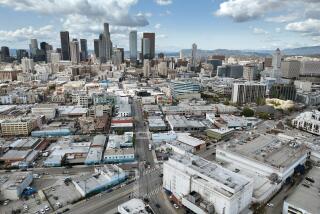L.A.’s future: ‘Silicon Beach’
What’s the future of L.A.’s economy? That’s a question that should be at the center of this year’s mayoral campaign. Key to that discussion should be recognition that Los Angeles, despite all its economic problems, is an increasingly prominent home to the next generation of technology companies that will drive the digital revolution in the 21st century.
Los Angeles’ tech awakening is unfolding in a slice of territory — dubbed “Silicon Beach,” which initially referred to Venice and Santa Monica and then expanded to Hollywood and downtown — where established giants such as Google and Apple have opened offices and where some 500 newcomer ventures have taken root. Silicon Beach culture, unlike Silicon Valley’s, is more consumer-oriented, drawing on art, entertainment and commerce to explore the intersections between technology and gaming, fashion, advertising and video.
The Los Angeles Mayor’s Council on Innovation and Industry released a report in December on how to grow Silicon Beach. The council’s recommendations — tax breaks and investment incentives, among others — were a good starting point, but more aggressive action is needed to make Los Angeles the global technology center that it could become.
L.A. has extraordinary resources to sustain and build upon its tech boom. Perhaps most surprising is its strong technology talent pool. UCLA, USC and Caltech collectively graduate more engineers annually than Stanford and Berkeley, major feeders of Silicon Valley. And L.A. tech staffers tend to possess more interdisciplinary skills than their northern counterparts, having developed expertise in cinema, communications, music, design and entrepreneurialism while pursuing engineering degrees.
The entertainment industry is another unrivaled resource. Hollywood studios are using profits from their cash cows — cable and television — to invest in digital entertainment. For example, Hulu, launched five years ago by News Corp. and NBCUniversal and one of the most successful online digital-content providers, generated nearly $700 million in revenue in 2012, which rivals many studio divisions.
And Los Angeles is at the center of 21st century video production. YouTube has opened new production studios in Playa Vista to capitalize on the number of content channels originating here. According to PwC’s Global Entertainment and Media Outlook, annual revenue generated by film and video entertainment delivered online is expected to double from $5 billion in 2012 to more than $10 billion in 2016. Companies based in Los Angeles produce most of that content.
What can the next mayor do to realize this potential? Here are three ways:
First, reinvent the post of chief technology officer for Los Angeles. Rather than a bureaucrat who keeps city websites functioning, the job should be held by someone who epitomizes L.A.’s blend of technology and creativity, who has experience in raising venture money to fuel start-ups and who has the standing to bring leaders of industry and academia together to form new partnerships. The new mayor can find some splendid candidates for the job on the Innovation Council.
Next, work with local universities and government officials — federal, state and local — to create programs that would allow graduating international students to remain here for a time and contribute to the growth of L.A.’s digital industry. Currently, we educate these students, hand them a degree and send them home, which amounts to an extraordinary loss of engineering, filmmaking and business talent. At USC alone, nearly 25% of graduate students are from other countries.
A postgraduate year at a university-connected or stand-alone tech start-up, for example, would give these students an opportunity to apply their entrepreneurial and intellectual skills and benefit the growth of L.A. as a tech hub. And even though many of them would eventually return home, their ties to locally based companies would help secure L.A. a place in the global tech economy.
Finally, use city-owned property to further develop an emerging tech corridor along the Expo Line. One of the most valuable parcels is in Culver City, where multiuse facilities could be built to house corporate offices, tech start-ups and university-generated or -connected ventures.
To spur this kind of real estate development, the new mayor should lobby major technology and communication companies with a vested interest in digital content and Los Angeles — Verizon, AT&T;, DirecTV and Cisco, to name some — to expand their presence in Silicon Beach by partnering with smaller tech ventures and organizations such as Digital LA, Amplify and StartEngine that work to professionalize and grow new businesses. (Full disclosure: Some of these firms are corporate partners of my institute at USC.)
Los Angeles probably never will reclaim its former status as a manufacturing center, and the growth potential of its traditional entertainment and trade industries is limited. Silicon Beach, by contrast, is an under-tapped catalyst for economic growth in L.A. and a potential source of steady and reliable revenue for city coffers. Developing ways to nurture it should be on every mayoral candidate’s agenda.
Lucy Hood is executive director of the Institute for Communication Technology Management at USC’s Marshall School of Business and former president of Fox Mobile Entertainment.
More to Read
A cure for the common opinion
Get thought-provoking perspectives with our weekly newsletter.
You may occasionally receive promotional content from the Los Angeles Times.










